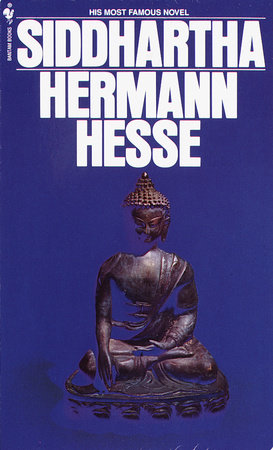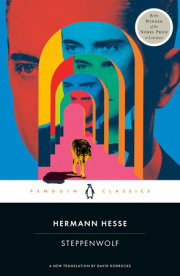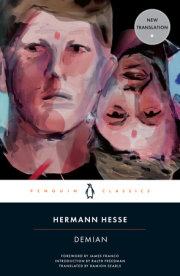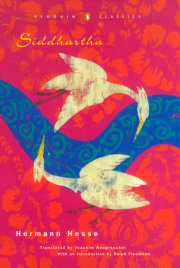Chapter 1
The Son of the Brahmin
In the shade of the house, in the sunlight on the riverbank where the boats were moored, in the shade of the sal wood and the shade of the fig tree, Siddhartha grew up, the Brahmin’s handsome son, the young falcon, together with his friend Govinda, the son of a Brahmin. Sunlight darkened his fair shoulders on the riverbank as he bathed, performed the holy ablutions, the holy sacrifices. Shade poured into his dark eyes in the mango grove as he played with the other boys, listened to his mother’s songs, performed the holy sacrifices, heard the teachings of his learned father and the wise men’s counsels. Siddhartha had long since begun to join in the wise men’s counsels, to practice with Govinda the art of wrestling with words, to practice with Govinda the art of contemplation, the duty of meditation. He had mastered Om, the Word of Words, learned to speak it soundlessly into himself while drawing a breath, to speak it out soundlessly as his breath was released, his soul collected, brow shining with his mind’s clear thought. He had learned to feel Atman’s presence at the core of his being, inextinguishable, one with the universe.
Joy leaped into his father’s heart at the thought of his son, this studious boy with his thirst for knowledge; he envisioned him growing up to be a great wise man and priest, a prince among Brahmins.
Delight leaped into his mother’s breast when she beheld him, watched him as he walked and sat and stood, Siddhartha, the strong handsome boy walking on slender legs, greeting her with flawless grace.
Love stirred in the hearts of the young Brahmin girls when Siddhartha walked through the streets of their town with his radiant brow, his regal eye, his narrow hips.
But none of them loved him more dearly than Govinda, his friend, the Brahmin’s son. He loved Siddhartha’s eyes and his sweet voice, loved the way he walked and the flawless grace of his movements; he loved all that Siddhartha did and all he said and most of all he loved his mind, his noble, passionate thoughts, his ardent will, his noble calling. Govinda knew: This would be no ordinary Brahmin, no indolent pen pusher overseeing the sacrifices, no greedy hawker of incantations, no vain, shallow orator, no wicked, deceitful priest, and no foolish, good sheep among the herd of the multitude. Nor did he, Govinda, have any intention of becoming such a creature, one of the tens of thousands of ordinary Brahmins. His wish was to follow Siddhartha, the beloved, splendid one. And if Siddhartha should ever become a god, if he were ever to take his place among the Radiant Ones, Govinda wished to follow him, as his friend, his companion, his servant, his spear bearer, his shadow.
Thus was Siddhartha beloved by all. He brought them all joy, filled them with delight.
To himself, though, Siddhartha brought no joy, gave no delight. Strolling along the rosy pathways of the fig garden, seated in the blue-tinged shade of the Grove of Contemplation, washing his limbs in the daily expiatory baths, performing sacrifices in the deep-shadowed mango wood, with his gestures of flawless grace, he was beloved by all, a joy to all, yet was his own heart bereft of joy. Dreams assailed him, and troubled thoughts—eddying up from the waves of the river, sparkling down from the stars at night, melting out of the sun’s rays; dreams came to him, and a disquiet of the soul wafting in the smoke from the sacrifices, murmuring among the verses of the Rig-Veda, welling up in the teachings of the old Brahmins.
Siddhartha had begun to harbor discontent. He had begun to feel that his father’s love and the love of his mother, even the love of his friend Govinda, would not always and forever suffice to gladden him, content him, sate him, fulfill him. He had begun to suspect that his venerable father and his other teachers, all wise Brahmins, had already given him the richest and best part of their wisdom, had already poured their plenty into his waiting vessel, yet the vessel was not full: His mind was not content, his soul not at peace, his heart restless. The ablutions were good, but they were only water; they could not wash away sin, could not quench his mind’s thirst or dispel his heart’s fear. The sacrifices and the invocations of the gods were most excellent—but was this all? Did the sacrifices bring happiness? And what of the gods? Was it really Prajapati who had created the world? Was it not rather Atman, He, the Singular, the One and Only? Weren’t the gods mere shapes, creations like you and me, subject to time, transitory? And was it then good, was it proper, was it meaningful, a noble act, to sacrifice to the gods? To whom else should one sacrifice, to whom else show devotion, if not to Him, the Singular, Atman? And where was Atman to be found, where did He reside, where did His eternal heart lie beating? Where else but within oneself, in the innermost indestructible core each man carries inside him. But where, where was this Self, this innermost, utmost thing? It was not flesh and bone, it was not thought and not consciousness, at least according to the wise men’s teachings. Where was it then, where? To penetrate to this point, to reach the Self, oneself, Atman—could there be any other path worth seeking? Yet this was a path no one was showing him; it was a path no one knew, not his father, not the teachers and wise men, not the holy songs intoned at the sacrifices! They knew everything, these Brahmins and their holy books, everything, and they had applied themselves to everything, more than everything: to the creation of the world, the origins of speech, of food, of inhalation and exhalation; to the orders of the senses, the deeds of the gods—they knew infinitely many things—but was there value in knowing all these things without knowing the One, the Only thing, that which was important above all else, that was, indeed, the sole matter of importance?
To be sure, many verses in the holy books, above all the Upanishads of the Sama-Veda, spoke of this innermost, utmost thing: splendid verses. “Your soul is the entire world” was written there, and it was written as well that in sleep, the deepest sleep, man entered the innermost core of his being and dwelt in Atman. There was glorious wisdom in these verses; all the knowledge of the wisest men was collected here in magic words, pure as the honey collected by bees. It was not to be disregarded, this massive sum of knowledge that had been collected here by countless generations of wise Brahmins.
But where were the Brahmins, where the priests, where the wise men or penitents who had succeeded not merely in knowing this knowledge but in living it? Where was the master who had been able to transport his own being-at-home-in-Atman from sleep to the waking realm, to life, to all his comings and goings, his every word and deed?
Siddhartha knew a great many venerable Brahmins, above all his father, a pure, learned, utterly venerable man. Worthy of admiration was his father, still and regal his bearing, his life pure, his words full of wisdom; fine and noble thoughts resided in his brow. But even he, who was possessed of such knowledge, did he dwell in bliss, did he know peace? Was not he too only a seeker, a man tormented by thirst? Was he not compelled to drink again and again from the holy springs, a thirsty man drinking in the sacrifices, the books, the dialogues of the Brahmins? Why must he, who was without blame, wash away sin day after day, labor daily to cleanse himself, each day anew? Was not Atman within him? Did not the ancient source of all springs flow within his own heart? This was what must be found, the fountainhead within one’s own being; you had to make it your own! All else was searching, detour, confusion.
Such was the nature of Siddhartha’s thoughts; this was his thirst, this his sorrow.
Often he recited to himself the words of a Chandogya Upanishad: “Verily, the name of the Brahman is Satyam; truly, he who knows this enters each day into the heavenly world.” It often seemed near at hand, this heavenly world, but never once had he succeeded in reaching it, in quenching that final thirst. And of all the wise and wisest men he knew and whose teachings he enjoyed, not a single one had succeeded in reaching it, this heavenly world; not one had fully quenched that eternal thirst.
“Govinda,” Siddhartha said to his friend. “Govinda, beloved one, come under the banyan tree with me; let us practice samadhi.”
To the banyan they went and sat down beneath it, Siddhartha here and Govinda at a distance of twenty paces. As he sat down, ready to speak the Om, Siddhartha murmured this verse:
“Om is the bow; the arrow is soul.
Brahman is the arrow’s mark;
Strike it with steady aim.”
When the usual time for the meditation exercise had passed, Govinda arose. Evening had come; it was time to begin the ablutions of the eventide. He called Siddhartha’s name; Siddhartha gave no answer. Siddhartha sat rapt, his eyes fixed unmoving upon a far distant point; the tip of his tongue stuck out from between his teeth; he seemed not to be breathing. Thus he sat, cloaked in samadhi, thinking Om, his soul an arrow on its way to Brahman.
One day, Samanas passed through Siddhartha’s town: ascetic pilgrims, three gaunt lifeless men, neither old nor young, with bloody, dust-covered shoulders, all but naked, singed by the sun, shrouded in isolation, foreign to the world and hostile to it, strangers and wizened jackals among men. The hot breath of air that followed them bore the scent of silent passion, a duty that meant destruction, the merciless eradication of ego.
In the evening, when the hour of contemplation had passed, Siddhartha said to Govinda, “Tomorrow morning, my friend, Siddhartha will go to the Samanas. He will become a Samana.”
Govinda turned pale when he heard these words and saw in his friend’s impassive face a resolve as unwavering as an arrow shot from the bow. At once, with a single glance, Govinda realized: Now it is beginning, now Siddhartha is on his way, now his destiny is beginning to bud and, along with it, mine as well. And he turned as pale as a dried-out banana peel.
“Oh, Siddhartha,” he cried, “will your father permit this?”
Siddhartha glanced over at him like a man awakening. Swift as an arrow he read Govinda’s soul, read the fear, read the devotion.
“Oh, Govinda,” he said softly, “let us not squander words. Tomorrow at daybreak I begin the life of a Samana. Speak no more of it.”
Siddhartha went into the room where his father was seated upon a mat made of bast fiber; he came up behind him and remained standing there until his father felt there was someone behind him. “Is that you, Siddhartha?” the Brahmin said. “Then say what you have come here to say.”
Said Siddhartha, “With your permission, my father. I have come to tell you that it is my wish to leave your house tomorrow and join the ascetics. I must become a Samana. May my father not be opposed to my wish.”
The Brahmin was silent and remained silent so long that the stars drifted in the small window and changed their shape before the silence in the room reached its end. Mute and motionless stood the son with his arms crossed, mute and motionless upon his mat sat the father, and the stars moved across the sky. Then the father said, “It is not fitting for a Brahmin to utter sharp, angry words. But my heart is filled with displeasure. I do not wish to hear this request from your lips a second time.”
Slowly the Brahmin rose to his feet. Siddhartha stood in silence with his arms crossed.
“Why do you wait here?” the father asked.
“You know why I wait,” Siddhartha replied.
Full of displeasure, the father left the room; full of displeasure, he went to his bed and lay down.
An hour later, as no sleep would enter his eyes, the Brahmin got up, paced back and forth, and went out of the house. He looked through the small window of the room and saw Siddhartha standing there, his arms crossed, unmoving. The light cloth of his tunic was shimmering pale. His heart full of disquiet, the father went back to bed.
An hour later, as no sleep would yet enter his eyes, the Brahmin got up once more, paced back and forth, and went out of the house. The moon had risen. He looked through the window into the room; there stood Siddhartha, unmoving, his arms crossed, moonlight gleaming on his bare shins. His heart full of apprehension, the father returned to bed.
An hour later, and again two hours later, he went out and looked through the small window to see Siddhartha standing there: in the moonlight, in the starlight, in the darkness. He went again from hour to hour, in silence, looked into the room, and saw his son standing there unmoving, and his heart filled with anger, with disquiet, with trepidation, with sorrow.
And in the last hour of night before day began, he got up once more, went into the room, and saw the youth standing there; he looked tall to him and like a stranger.
“Siddhartha,” he said, “why do you wait here?”
“You know why.”
“Will you remain standing here, waiting, until day comes, noon comes, evening comes?”
“I will remain standing here, waiting.”
“You will grow tired, Siddhartha.”
“I will grow tired.”
“You will fall asleep, Siddhartha.”
“I will not fall asleep.”
“You will die, Siddhartha.”
“I will die.”
“And you would rather die than obey your father?”
“Siddhartha has always obeyed his father.”
“So you will give up your plan?”
“Siddhartha will do as his father instructs him.”
The first light of day fell into the room. The Brahmin saw that Siddhartha’s knees were trembling quietly. In Siddhartha’s face he saw no trembling; his eyes gazed into the distance straight before him. The father realized then that Siddhartha was no longer with him in the place of his birth. His son had already left him behind.
The father touched Siddhartha’s shoulder.
“You will go,” he said. “Go to the forest and be a Samana. If you find bliss in the forest, come and teach it to me. If you find disappointment, return to me and we will once more sacrifice to the gods side by side. Now go and kiss your mother; tell her where you are going. It is time for me to go to the river and begin my first ablutions.”
He took his hand from his son’s shoulder and went out. Siddhartha lurched to one side when he tried to walk. Forcing his limbs into submission, he bowed before his father and went to find his mother to do as his father had instructed.
In the first light of dawn, as he was slowly leaving the town on his stiff legs, a shadow rose up beside the last hut, a shadow that had been crouching there and now joined the pilgrim: Govinda.
“You came,” said Siddhartha, and smiled.
“I came,” Govinda said.
Copyright © 2006 by Hermann Hesse. All rights reserved. No part of this excerpt may be reproduced or reprinted without permission in writing from the publisher.







